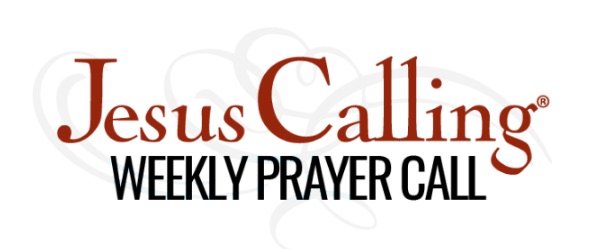Connection Through Praise and Worship: Matt Redman & Mark Schultz
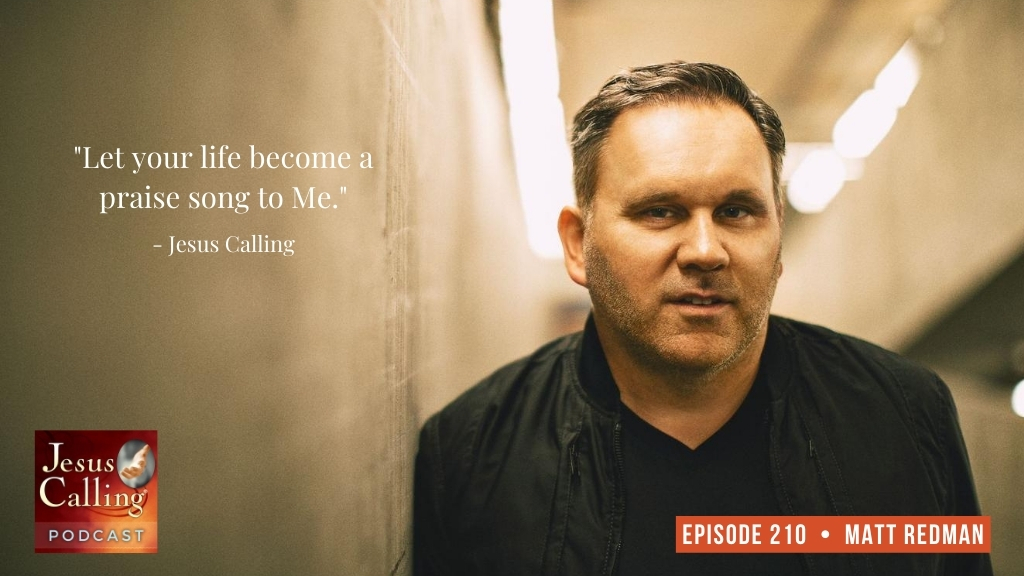
Matt Redman: There is something about worship music when you—I don’t know if it’s a softening of the heart or an opening of the heart. I’m convinced there’s something about drawing near to God that’s going to keep you open to some degree.
Connection Through Praise and Worship: Matt Redman & Mark Schultz – Episode #210
Narrator: Welcome to the Jesus Calling Podcast. Today’s guests share the indelible power that music has to heal our hopes and our hearts: worship leader Matt Redman and singer-songwriter Mark Schultz.
GRAMMY-winning worship leader Matt Redman has traveled all over the world bringing people together in song. Along the way he has sung in venues such as Madison Square Garden, Wembley stadium—as well as recording in iconic studios such as Abbey Road in London and Capitol Records in LA. Matt believes in the healing power of worship in our lives and credits his expression to God through music for saving his life during an extremely difficult time.
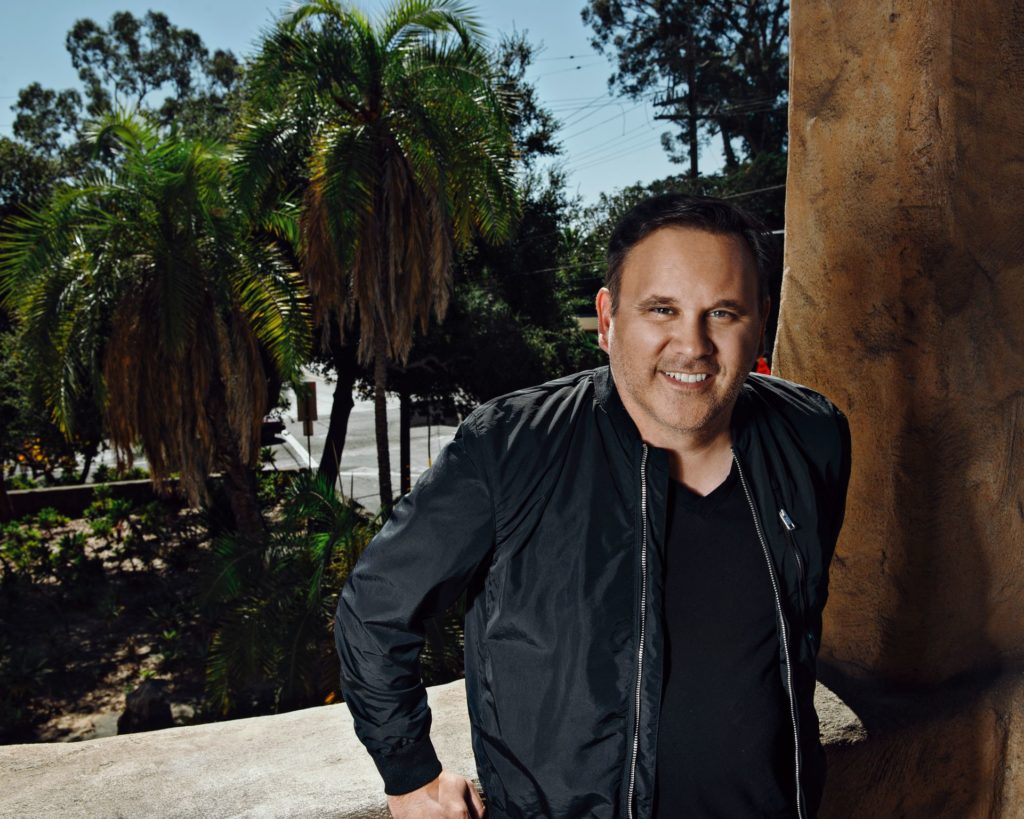
Matt: My name is Matt Redman. I was born in the UK. I currently live in California with my wife, Beth, and our five kids. We’ve got one daughter and four boys from the age of nineteen down to ten, so it’s never a boring moment. And we love doing life.
Drawing Close to God Through Music
Sometimes people ask me, “Why do you write songs?” or, “How did you start writing songs?” And the reason was because I needed to. I needed to talk to God. I needed to cry out to God. Music seemed like a really powerful way to do that.
“I needed to talk to God. I needed to cry out to God. Music seemed like a really powerful way to do that.” – Matt Redman
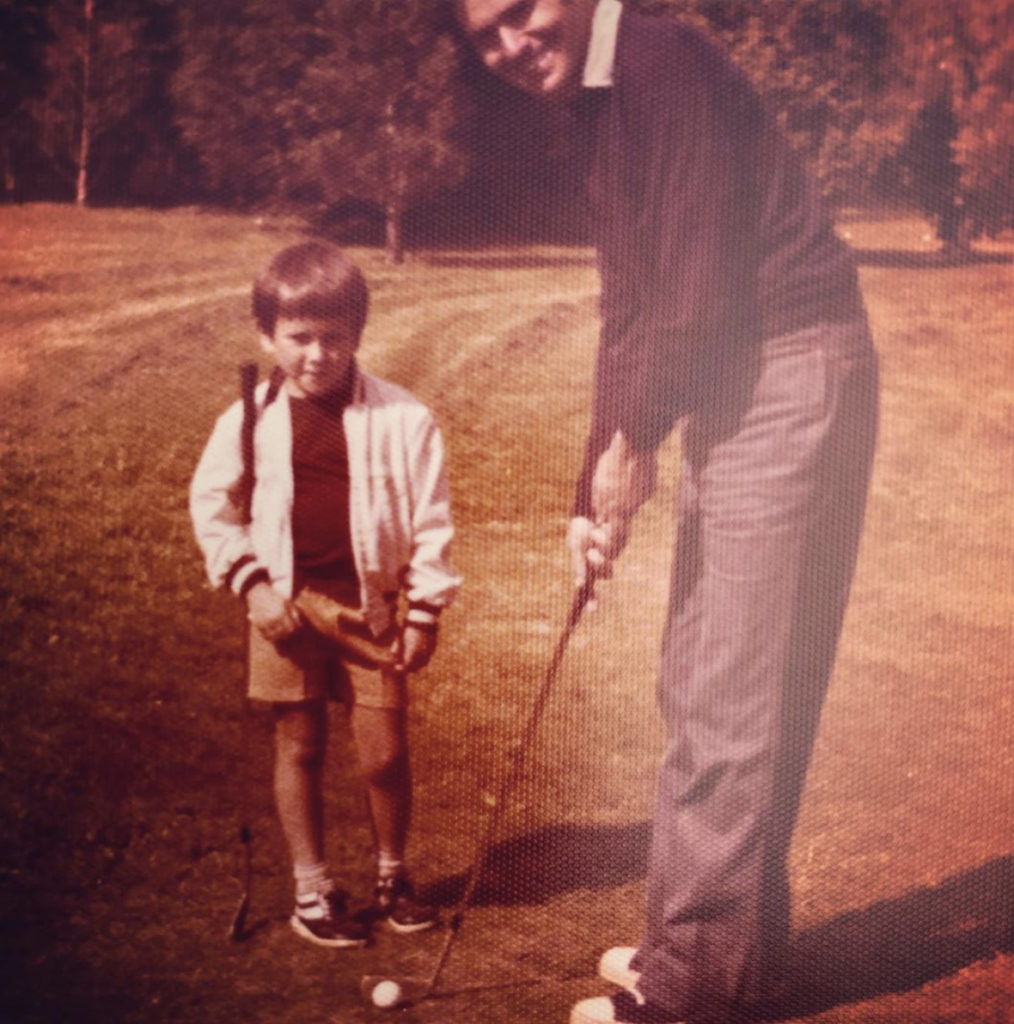
When I was seven years old, I lost my father. He actually took his own life, and that was obviously a crazily hard thing to take in and process at the time. But then things didn’t get much better. Some abuse happened to me in my teenage years, and the guy who did that ended up going to jail. It was a crazy, turbulent time. But the thing that was keeping me sane and stable was my faith, and particularly faith expressed through music. So I started playing music because I wanted to sing some of the songs we were singing at church.
What actually happened was a group came over from America a month after my dad died, and they brought this wonderful new expression of worship music. And for me, it was so captivating. I couldn’t have summed it up at the time, but I guess the dynamic that I was seeing was the people of God in the presence of God pouring out the praises of God. There was something so appealing about what these guys were doing, so from that moment on, I loved worship music.
I remember the first song I ever led, it was “There Is a Redeemer” by Melody Green. I don’t think we even got to the third verse, we never got to “stand in glory,” because I was so nervous I could barely get through the first two verses. But the moment I started doing that, I loved it. I loved seeing what God could do through these songs. I loved seeing people connect with Him through them. I loved that we weren’t just singing about Him, but we were singing to Him. I loved that we weren’t just singing to Him, but we were drawing near to Him and He was drawing in to us. There was this divine encounter happening through this simple little song, which is so hard to describe or express, but it was so real and it became apparent we were worshiping the living God here.
“I loved that we weren’t just singing about Him, but we were singing to Him.” – Matt Redman
Staying Open to God and Others
What became apparent the older I became, and the older my kids became, and the more I was married, in some of the areas particularly to do with emotional availability, emotional capacity, emotional attunement, I was not very strong at all. I needed some help. I went to see a counselor, and the counselor explained to me that, “You can’t compartmentalize with your emotions. You can’t be shut down towards your father’s suicide when you were age seven, but then super alive towards your sons and your daughter and your wife. It doesn’t work like that. If you’re gonna shut down, you’re gonna become a little shut down across the board.”
And I think maybe I always explain that away, “Oh, it’s kind of my personality,” or, “You know, I’m just not that sort of person.” But I started to realize it’s actually affecting the ones I love. It’s affecting my family. It’s affecting my friends. This is not really a healthy way to do life.
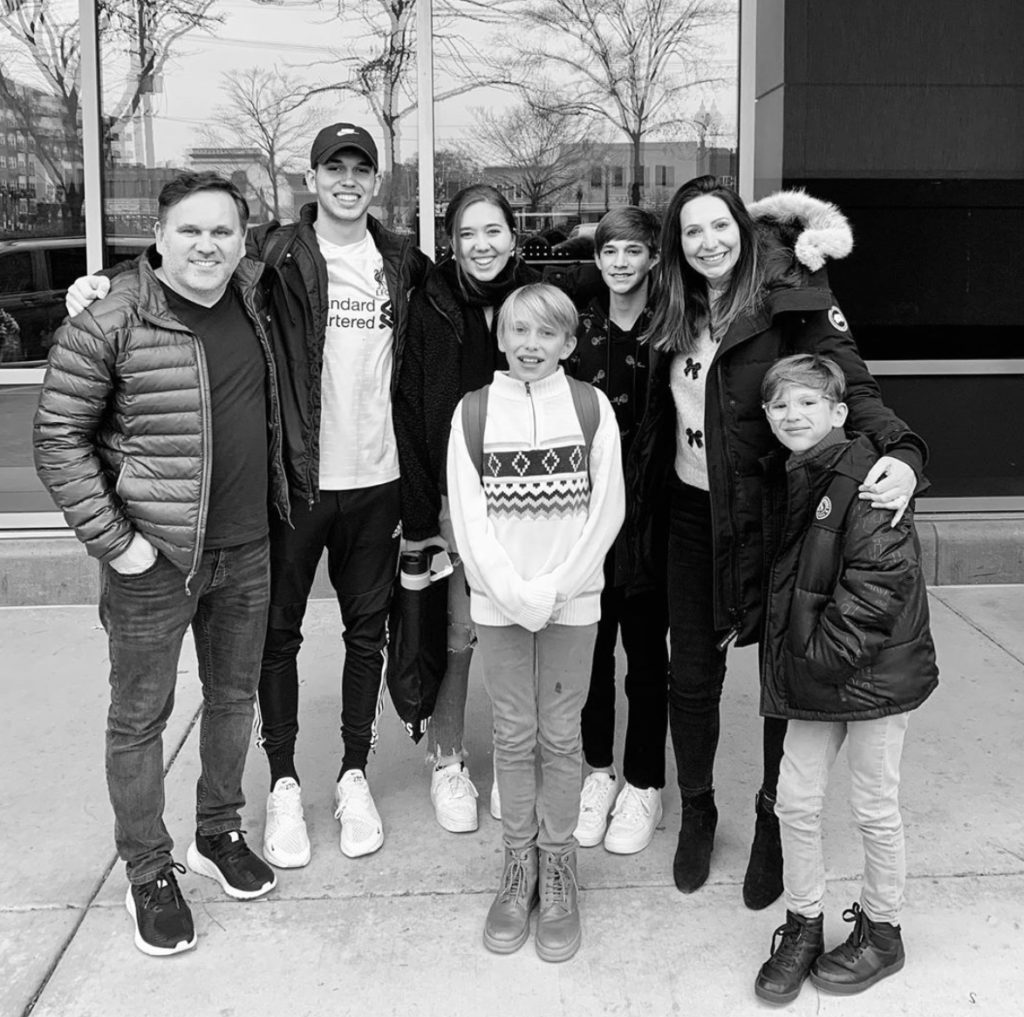
When you’re in some kind of ministry up front on a stage or something—for me, it’s doing music—if you’re not careful, that stage can become a barrier. It can become a barrier to letting other people into your life, to speak into your life, to look into your life, to be close in accountability, in a sharpening, or that kind of thing. But also, you can even use the stage as a barrier to letting God work in your life.
You know, leadership doesn’t guarantee you’re going to have good character or be healthy emotionally. In fact, it’s probably going to test you to the extreme, being on that stage and carrying some of the things you carry, ministering some of the ways you minister, it might make it more important that you deal with some of these things and you don’t let any of that psychological junk get in the way of your leadership.
The interesting thing for me, as a worship leader and songwriter, I do believe I had some measure of healing just through the fact that I was opening my heart to go through worship music. And when you worship the living God, you can expect that kind of thing. You can expect an encounter, and you can expect it to be this not just this ritual, but relationship, this dynamic, open-ended conversation with Jesus.
The Jesus Calling books have really played quite a prominent role in our family’s spiritual life right now. They’re coming out daily. My wife, Beth, has been so good at doing that and seeing our kids reading one of them—[they] will do the reading for the day. And the thing I love about that is it tells you God is speaking. It tells you God is speaking to you. Sometimes, when we think about prayer, we just think about our speaking to Him. We’re pouring out our praise or our requests. Yes, that’s a great thing to do. But the great thing about Jesus Calling is that whatever else you’re doing in your day, it reminds you God is actually wanting to speak to you. If you quiet yourself down, you can hear the voice of God. And that’s a really, really important part of faith.
Isn’t that sometimes the biggest challenge of all? Life is never not busy, there’s always distraction, there’s always something else to do. But something about taking time to listen, taking time not just to pour out your prayers and your requests, but taking time to quiet yourself, still yourself, wait on God, see what He might have to say to you today.
The Stories That Songs Tell

Being a songwriter, I’ve always been fascinated with the Psalms. You know, I love that right there in the middle of scripture, we’ve got these one hundred and fifty Psalms. In fact, they would have been the hymnbook of Jesus as He walked the earth. And you’ll find every imaginable emotion in those. You’ll find the depths of depression and angst, and you’ll find the heights of joy and celebration. And there’s something in there for wherever you are in life. And isn’t it wonderful that right there, in the middle of scripture, is this hymnbook, this songbook?
We’ve always been a singing people. The people of God have always been a singing people. You look throughout history, and you’ll see that the people of God found a way to sing to Jesus together. I love looking at some of the old hymns, some of the truth. They bring some of the angles onto the cross of Christ, or the windows onto the heart of God, or the story of God they bring. And I love that these days, worship leaders like me get to carry on in that tradition and try and find new ways to sing to God.
“10,000 Reasons” has been the song that has connected the most, had the most momentum. It’s such a simple little song. It doesn’t even have a pretty chorus or bridge. It’s to the point where I didn’t even know if it was finished before we recorded it. Some other people on the team strongly encouraged me, “Yeah, we’re definitely recording this one,” and it’s just been wonderful. It’s just four chords and the truth. There’s nothing complicated or super progressive, creatively, about it, but it’s just a simple little hymn or song to Jesus.
It’s been really, I don’t know, humbling, exciting, encouraging, just seeing that song travel around the world, maybe from a little backstreet in Mumbai somewhere and getting a video of an orphanage singing it, or township somewhere in Africa, or somebody in a hospital room.
I think one of the challenges of trying to portray God through music is to do with trying to paint the biggest picture of Him that you can. Obviously, our vocabulary is very limited, for starters, but it’s more than that. Something about the culture we live in where so much goes in the opposite direction.
“One of the challenges of trying to portray God through music is to do with trying to paint the biggest picture of Him that you can.” – Matt Redman
You cannot worship without wonder. You know, you can adore, applaud, admire without wonder, but you cannot worship without a sense of wonder for worship really to be worship. That has to be in the mix, it’s a key ingredient. And I think that’s the challenge when we’re trying to portray an accurate image of God in our music. Does what we’re seeing here match up with the God we meet in scripture?
You know, He’s the lion and the lamb, He is the God who thunders and whispers. He’s a God who terrifies, and yet He befriends. He’s the one who knelt down, washed the feet of His disciples, even though He’s the one whose footstool is the earth. He’s the one who hung in agony on beams of wood that He Himself had called into being. This is Jesus. This is who we worship. We can sing about the name of Jesus, the throne of Jesus, the love of Jesus, the kingdom of Jesus. All those things—the word of Jesus, the truth of Jesus. All those things are completely unshakable and unchangeable.
“He’s the lion and the lamb, He is the God who thunders and whispers. He’s a God who terrifies, and yet He befriends. He’s the one who knelt down, washed the feet of His disciples, even though He’s the one whose footstool is the earth.” – Matt Redman
Narrator: You can find Matt Redman’s latest record, Let There Be Wonder, anywhere you buy music.
If you or someone you know is contemplating suicide, there’s help. Please call the National Suicide Prevention Hotline at 1-800-273-8255.
We’ll be right back after a brief message about a way you can connect to Jesus Calling readers each week through prayer.
Did you know that Sarah Young, the author of Jesus Calling, prays for her readers each day? In that spirit, we want to extend the Jesus Calling prayer community out to you in a more personal way. Each Tuesday morning, you can dial in to the Jesus Calling Weekly Prayer Call, where the team from Jesus Calling and special guests will minister to us during a ten-minute call to reflect on that day’s passage from Jesus Calling, read scripture references, and pray together for each other and our world. Prayer call times are 8:00 a.m. Eastern, 7:00 a.m. Central, 6:00 a.m. Mountain, and 5:00 a.m. Pacific and are for U.S. only.
For more information on the Jesus Calling Weekly Prayer Call, or to submit prayer requests, please visit www.jesuscalling.com/prayer-call.
Narrator: Singer-songwriter Mark Schultz came to Nashville, supported by the love of his parents, a strong faith and a big dream to make it in the music business. But when he didn’t get the red-carpet rollout he thought was waiting for him, Mark began to doubt his dreams of writing and performing, until one day as he was waiting tables, when he met a customer who would change his life forever.
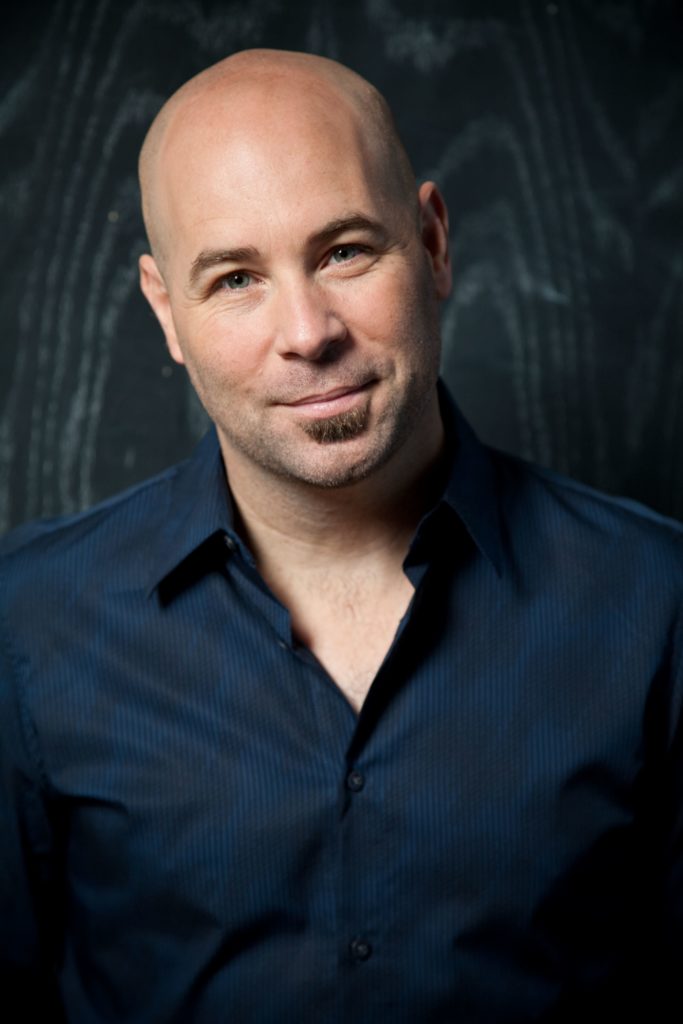
Mark Schultz: I’m Mark Schultz, singer-songwriter. I’ve been doing music, gosh, I guess I came to Nashville in 1994, and thought I’d get a record deal since I drove into town. Obviously, whoever was giving those out was at lunch when I came in. But yeah, I became a youth director for about seven years, and I would say that was the greatest job I ever had, and then that turned into a full time music for the last, gosh, twenty years.
Finding Love in an Adoption Story
I grew up in Colby, Kansas, which is a town of 5,000 people, which is not all that big. But I was adopted. I always say that I got the best mom and dad in the world. I was the middle kid who was adopted, and so they had my brother, he’s five years older than me. I’m not sure if they knew they could have kids after that, so they adopted me, and then as so often happens, my sister was born a year later.
I didn’t even know what “adopted” meant. My sister and I were going through our baby books. I said, “Hey, Sue”—my sister—”has more information in hers than I do. What’s that about?”
And my mom said, “Well, that’s because you’re special, you’re adopted.”
And I was like “Well, what does that mean?”
Mom said, “We got to pick [you] out special. With your brother and sister, God gave us your brother and sister, but we got to pick you out special.”
And I always love that story, because as we got older, my sister and I were a year apart in junior high, so we’d get into arguments. And we’re having an argument one day, and she said, “Oh yeah?” Well, she was just mad, and she said, “You’re not even supposed to be in this family because you’re adopted.”
And it should have really devastated me, but I began to smile, and I just remembered the words of my mom. And I said, “Yeah, that means Mom and Dad picked me out special, they just got stuck with you.”
And so I’ve always loved that I’ve been adopted, and it’s a special part of my story. And again, I feel like I got the best parents in the world.
But I grew up in a small town, and I was the quarterback in high school and I played basketball and I was the pitcher in baseball and I ran track, and went to church. My mom and dad were the Sunday school teachers, and when I was in grade school, [we went to] a little Methodist church there in Colby. So church and faith has been a part of my life ever since I can remember.
Parents Who Support Our Dreams
I used to sell pianos, because I love pianos, and I would sell a piano and I would play it in people’s houses, and that’s how I sold the pianos. They were like, “Could you play us some songs?” I would and I would write songs, and I just love that. A girl that I knew when I was in college―I continued to write songs, I would stay up late and go to the music room, I was in a special singing group in Kansas State, and I would sneak into the practice rooms at two o’clock in the morning to write my songs—said, “You know, I can see you being a pop singer/songwriter or a Christian singer/songwriter.”
And I said, “A Christian singer/songwriter? I don’t even know what that is,” because in my small hometown, we didn’t have Christian music. you know, there was not a Christian radio station. And it wasn’t until I met a girl in college that introduced me to Steven Curtis Chapman, and [she] said, “Hey, you’ve got to come to this concert.” And I said, “Well…” I don’t even know what. And I went to the concert, and after it was over—we went out in the parking lot before we left. This group of people that I got invited to go with all got in a circle, and they held hands, and they prayed for each other before we left, and I was like, “I’ve never seen anything like this before.” And that was my first introduction to Christian music. I thought it was pretty special, and that was a kind of precursor for the next thirty years for me.
I remember being in Nashville my first months there. I would call home because I was scared out of my mind, and I didn’t know what I was doing, and I was a waiter, and I was going nowhere fast. And I still remember this, I would call home from the room that I was renting in this house, and feeling like, I don’t think it’s going to work out. And I would call my dad, he would answer the phone—my mom or dad—and I’d say, “Hey, can you put Dad on?” And I said, “Dad?”
He said, “How are you doing?”
I said, “Well, I’m a waiter.”
And he said, “Are you playing music?”
And I said, “No, not really.”
He said, “Are you paying your rent?”
And I said, “Yes.”
And my dad said, “My son’s making it Nashville.”
It’s the funniest thing. I was doing the bare minimum that I could possibly do to just survive, and my dad’s like, “My son is making it in Nashville.” But true enough, my mom and dad came to visit six months after I’ve been here, and I took him on a tour of Nashville, a walking tour, and I remember I showed him the Ryman Auditorium, and my dad put his arm around me said, “Is this where my son is going to play someday?”
I said, “Dad . . .” I kind of felt crushed, because I was like, There’s no way, you’ve really got to make it to play at the time. And I knew by then it’s just probably not going to happen.
And my dad said, “You know, I used to listen to the Grand Ole Opry from here.” And he put his arm around me, and he said, “Yeah, my son is going to play here one day.”
And that just stuck with me, it kind of broke my heart. But that was in my head the whole time. But I think there’s something special about hearing a father’s words speak over you, that they believe in you, and cast a vision for you, and I think there’s something about that that you kind of grow into that as your story unfolds.
“There’s something special about hearing a father’s words speak over you, that they believe in you and cast a vision for you. I think there’s something about that, that you kind of grow into that as your story unfolds.” – Mark Schultz
A New Mentor, A Dream Fulfilled
I had some detours on my way to the Ryman. I was a waiter, and I also was an intern at BMI. They collect royalties for singers and songwriters, so I did that for free, which is just right across the street from here.
And I took a girl’s internship, because she was leaving, and she said, “Hey, come have my job.” And she said, “You know, you’re crazy, you’re a nut. You need to hang out with a guy named Martin DeVries.”
And I said, “Well, who is that?”
She says, “A youth minister at this church that I met, I work with their youths, the kids. You’d be great with him. You guys have the same personality.”
I was like, “Oh man, no way am I calling him, because he’d make me hang out with kids, and I’m allergic to them.”
So I ripped up the number and threw it in the trash can. I thought I’d never want to meet this guy, so I didn’t call him.
And nine months later, I’m a waiter at the Stouffer Hotel, which is the Renaissance Hotel now, down in Nashville, and I’m the only one on this Saturday that’s working because there’s nobody else there. And the manager said, “If nobody comes in by eleven, you can just lock the door and go home.” So I was looking so forward that.
This couple walks to the door at like ten fifty-nine, I’m like, “Sorry, we’re closed.”
And they said, “We’ve got a free lunch. We’re supposed to have a free lunch here.” And they have a little coupon, so I sat them at their table and I brought their food out. And there’s a hot pepper on this guy’s plate like a garnish, and he’s like, “Hey, waiter, let’s do a hot pepper eating contest.”
I was like, “Okay, weirdo.”
So he kept the hot pepper half, gave me the hotter half, and he said, “Whoever eats this hot pepper first loses.”
He stares at me and I stare at him, my face turns red, and we start sweating. His wife’s laughing, and I drink his water, and I drink his wife’s water, and I lost. And he was like, “Man, you’re a nut. You want to hang out with kids?”
And I was like, “No! I don’t want to.”
And I said, “What’s your name?”
And he said, “Mark DeVries.”
And I said, “Are you a youth minister in town?”
He said, “How would you know that?”
And I said, “A girl told me I must call you, and I just never did.”
And so he talked me into going on a ski trip with these kids, and I got duct taped to a bed at six o’clock in the morning on one of the ski trips. But he brought me back, and he said, “Hey, here’s a grand piano. I want you to come hang out here at the church. How much are you making as a waiter?”
And I was like, He’s going to offer me a job, so help me. I really jacked the price up, so I said, “Six dollars and ten cents an hour,” which is ten cents more than I was making.
And he said, “Well, I’ll pay you six dollars and eleven cents to come here and work for me.”
And I said, “What do you want me to do?”
And he said, “Well, what did you come here to do?”
And I said, “Well, I came here to write songs in Nashville.”
And he said, “How many have you written this year?”
And I said, “Zero.”
And he said, “Why?”
And I said, “Because I’m trying to make enough money to live on so I can write songs.”
Then he said, “Well, that’s why you’re going to work for me, cause you’re just going to write songs.”
And I said, “About what?”
He said, “Whatever you want, and in your free time, just hang out with some kids.”
And I was like, “Are you kidding me?”
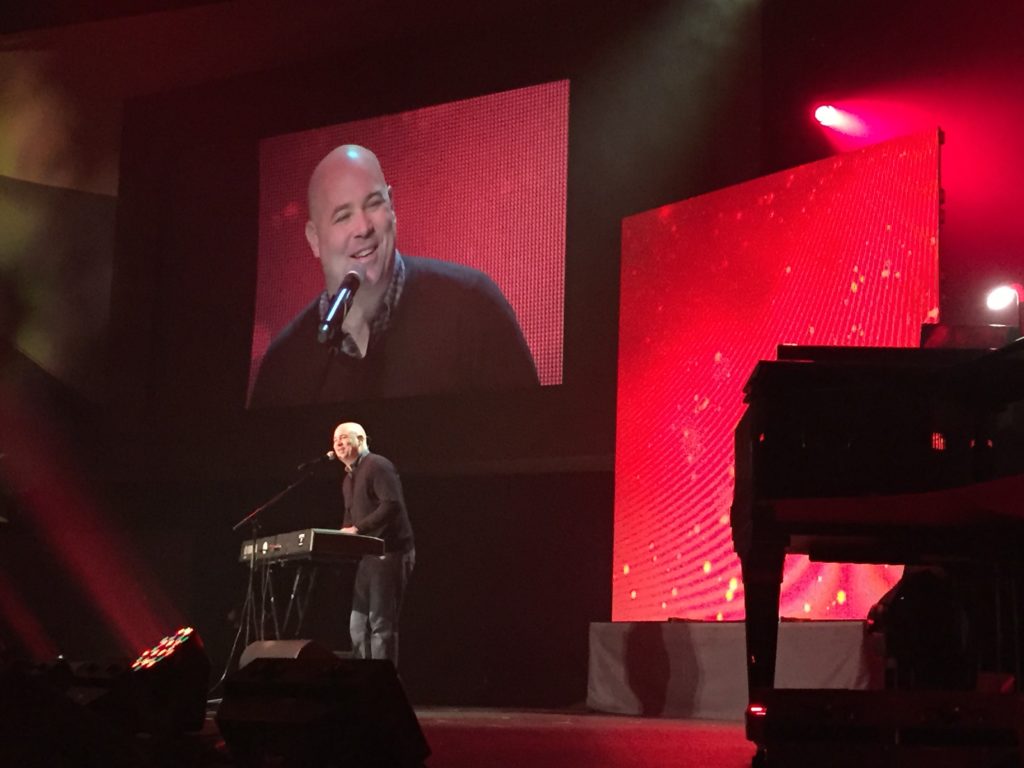
He set a hook in me like a fish. For seven years, I became the youth director at that church, and fell in love with the kids and my songs became about those kids. Here’s a little guy in our youth group that’s got cancer, and his dad’s struggling, why don’t you write a song for them? Here’s a mission trip y’all went on, write a song about that. And sure enough, I would write the song, and the kids would sing it on Sunday morning after our mission trip, and the whole congregation feltl like, Man, we’re a part of this thing. We feel like we know the story. We feel like we’re connected with our kids, we feel like we’re connected with what God’s doing on your mission trip.
And so kids say, “Hey, play your song about our mission trip!” And I would, and they bring their parents, and then the concert got bigger and bigger. I did two concerts at First Presbyterian that were just wall to wall, you know, 800 to 1,000 people.
Somebody said, “Hey, you should do a show at the Ryman because you’re getting too big for our church.”
And so I said, “Okay.”
They were kidding, and I didn’t know, so I just called the Ryman and asked if I could do a concert there. And they said, “Who are you, again?”
And I said, “Well, I’m the youth director at a church.”
And so they’re like, “We’ve never done this before.” And sure enough, we planned it and did the whole thing, and a gospel choir came in and sang backgrounds, but I thought, Man, if this doesn’t work it will cost me a lot of money to put this show on. I said, “If this doesn’t work, at least I’ll say I did my best before I leave Nashville, I did the best I could do.”
I still remember I didn’t know how many people were in the audience. I was just hoping there were a few. And Mark DeVries, the youth minister, walked out on stage. I’ve worked for him for seven years now, and he said, “We’re here tonight because there was a kid from Kansas that came to Nashville with a dream and surrounded himself with people who were just crazy enough to believe it might come true.” And he said, “Welcome to Mark Schultz at the Ryman!” And the curtain went up, and I looked out in the audience, and it was sold out, and my mom and dad were sitting on the front row in the balcony.
The record company was there, they heard that there was a show there that night, and they just came to it. And then I got a record deal after that show, and that was eighteen years ago, and we’ve been doing records and doing concerts ever since. So that would be one of those moments that I look back on that I feel like it was a dad’s vision and a belief in me, just following that.
“That would be one of those moments that I look back on that I feel like it was a dad’s vision and a belief in me, just following that.” – Mark Schultz, on a dream fulfilled to play at Ryman Auditorium
The Lord was in it, and had I not met Mark DeVries, the youth minister—and I tell him this all the time. We run at five thirty in the morning. I don’t know why we’re running at five thirty, there’s other times it would be great to run during the day, but I’ve said it time and time again: I wouldn’t have met my wife, I wouldn’t have the kids that I have, I wouldn’t have the career that I’ve had, or wouldn’t have played the Ryman without meeting him.
And you know, what’s so special about him is he wasn’t the kind of boss—if you could call him that as a youth minister—who said, “You need to do this so I can look good.” He said, “What’s your talent? Let me just love on you and tell you to be who you’re meant to be and let me get behind you and do that.” And I feel like that’s been the difference, you know? I never did feel like he wanted anything from me. I felt like he wanted something for me, so that’s the kind of dad that I try to be now.
Putting on “Clothes” That Fit at the Right Time
I’ve had six or seven or eight records, I can’t really remember, but it was so interesting when I wrote that first record when I first came to Nashville. I thought, Man, I would like a record deal. And I was just looking for that as soon as I came to town, and it was as if God opened up a closet and there were a bunch of clothes in there. I’ve said this to kids who want to get into music. I looked at those clothes, and I was like, These clothes do not fit me, they’re just too big for me. I mean, I just don’t even know how to fit in those clothes. So in a way, God closed the closet door, and then I met Mark DeVries, and he says, “Come work for me,” and I do. And I spent seven years with kids and saw what God was doing in the life of the kids and the families, and I started writing songs about that.
And then at the Ryman, it was like God opened up the door again. I was like, Those clothes fit me, now I have something to say. And it was from the experiences that I’ve had.
During that time, I had to learn how to become a dad. I had to learn how to become somebody that could take care of a family, not just be a dad who shows up every once in a while and checks and says, “Everybody okay?” But, you know, be a great dad. And when I first started, it was like I opened up the closet door, and here’s the clothes, I’m like, There’s no way I can fit in these clothes. And now, after six years, I feel like I can open it up, and I could look in there and go, Oh, I see what that means now. I see how I’m changed now and I see where I have more of a passion. My wife has a [sign in her] office that says, “Your greatest gift to the world may not be what you do, it may be who you raise.” And so step inside those clothes, and say, “Hey, maybe it’s not about me, about all this and what kind of song can I deliver. Maybe it’s about what my sons are going to do when they grow up, or my daughter.”
Coming Full Circle on Adoption
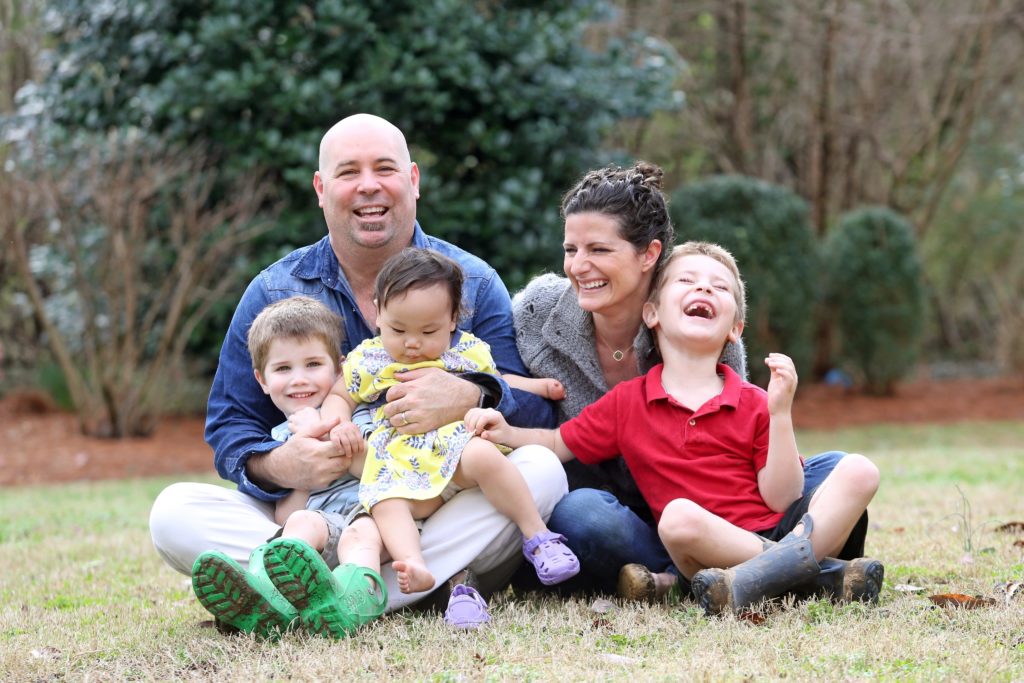
My wife said, “Hey, we should do devotionals at dinner time.” So in the middle of our table, we’ve got a Lazy Susan, I guess is what you call that, and it’s got candles and stuff on it. Anyway, she put a devotional book there, so at night after dinner, she’ll say, “Hey, let’s read a devotional.” So we’ll pull out the devotional book and we’ll read it. And funny enough, I’m coming to the interview today, and I brought my son Ryan with me, and we’re walking out the door, and she said, “What’s your interview?”
I said, “It’s Jesus Calling.”
And she smiled and she walked over to that table and she picked it up. She said, “You want to just take it with you?” And it’s the kid’s version of Jesus Calling that we’ve been reading out of as our devotion. What’s so funny about it is that when I read it at dinnertime, and the kids are taking their plates and all that kind of stuff, I’m telling my wife, “Hey, this is pretty good! This is actually a very good devotional, I think I’d like to read this,” probably because it’s just my speed, since it’s for kids, but I think it’s been great. And here we’ve been reading out of it for two years, and I just looked at the front of the book and saw it was called Jesus Calling. So yeah, pretty neat story.
This is called A Taste of Heaven, July 8th, [Jesus Calling for Kids]
I have told you this so that my joy may be in you and that your joy may be complete. –John 15:11
When you come to Me, be ready. I am a God of unlimited blessings. So get ready to be blessed! Open up your heart and mind to receive more and more of Me. And as you do, I will pour in My blessings of Love, Peace, and Joy—until you are overflowing. These blessings are only a tiny taste of what waits for you in heaven. The Joy that you have from Me now is like a sparkler in your own backyard, while the Joy of heaven is more like the fireworks in Washington D.C. on the Fourth of July—but ever so much greater. I give you real Joy in this world, but in heaven I will make your Joy complete and overflowing.
So I was adopted, and the story continues. We said, “Maybe we should adopt, too.” My wife said, “Let’s go to China and adopt a baby from China.” So Maya May is our newest member of our family. She’s almost two now, and is just a huge joy in our life, and so it’s something to be a dad and it’s something to adopt.
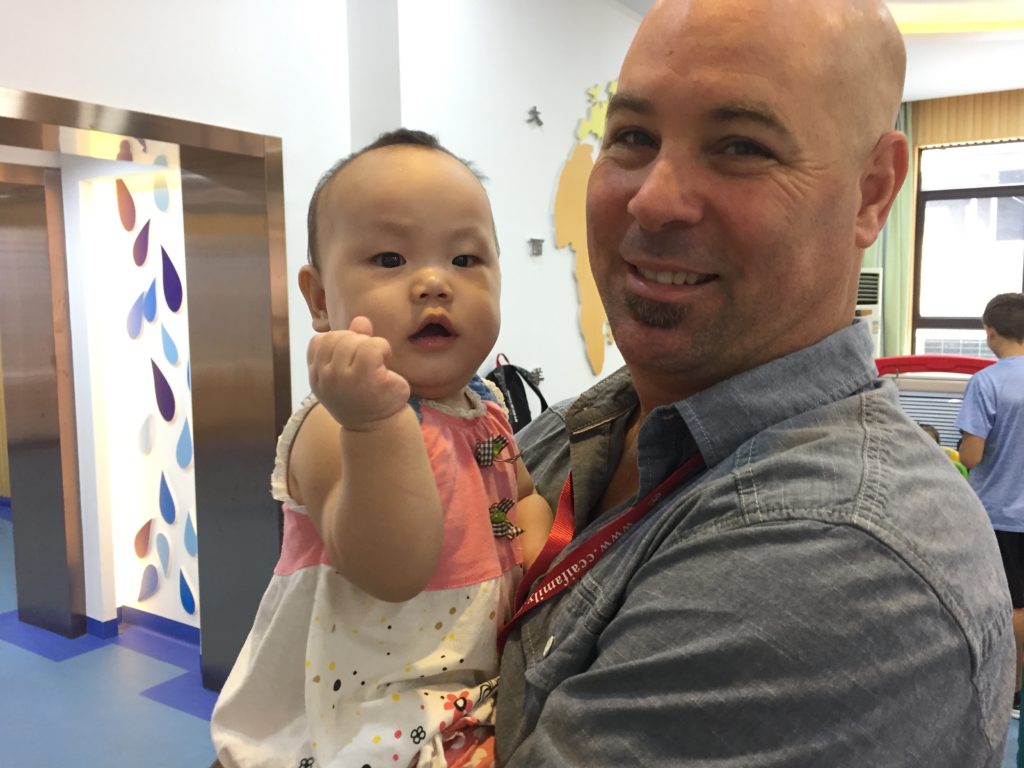
And I’ll say this, this is what I know about adoption, and this has been a big thing for me to realize. When I was adopted—I think the reason I’ve done well and excelled, whether it was football or basketball or baseball or music, a part of it was in a small way, I was like, Well, I didn’t want my parents to adopt me and then think they got a dud. I want to be great at everything I did. You know, I want to be the pitcher and I want to be the quarterback and I want to be all that kind of stuff, and sing, and I want to perform with standing ovations, it feels good, and that’s affirming, like, “Hey, they made a good choice.”
And so when we adopted her, the switch that happened to me in the adoption story is that I knew her for about ten minutes, and I said, “Man, there’s nothing she can do to make me love her more or less, or think anything more or less of her. She is a part of me. I just love her.” And that was a huge thing for me. And we hear it all the time in Christian churches, like, “Hey, we’re adopted. We’re children that were adopted, and it doesn’t stop us from thinking, If I do more, if I do a little more, God will think, ‘Wow!’” this kind of stuff. And now I get this sense from adopting our little girl that that is so backwards. It’s the idea of, God doesn’t want something from us—He wants something for us, you know?
“God doesn’t want something from us—He wants something for us.” – Mark Schultz
And so I think that’s been the big takeaway for me from adopting our daughter. I’m glad there was a part of me that said, “Oh, maybe that’s the end of her adoption story.” But I’m so glad that we took that full circle, because now I feel like I’ve got a clear picture of what God meant by “adoption.”
Narrator: To learn about Mark’s latest projects, or his nonprofit, the Remember Me Mission, follow him on social media.
If you’d like to hear more stories about the healing power of music, check out our interview with superstar singer Gloria Gaynor.
Narrator: Next time on the Jesus Calling Podcast, we talk with writer and entrepreneur Mattie Jackson Selecman. Mattie and her husband Ben were a month away from celebrating their first wedding anniversary when Ben, a healthy 28-year-old lawyer, passed away after suffering a traumatic head injury after a fall. Mattie reflects on the pain and struggle that come from asking this question over and over again: Why?
Mattie Jackson Selecman: At the end of the day, what we were praying for Ben, we kept praying, “May he be healed and whole.” And he’s just with Jesus, you know, and that’s the most healed and whole you can be. But it is very difficult, and I know this is why a lot of people struggle and suffer is [knowing] that God could have stopped it. And on paper, we did all the things we were supposed to do, you know, to “get the miracle.” But we didn’t. And part of understanding and processing and finding joy amidst the pain, I think, doesn’t come from having that question answered.
Narrator: Want to hear more inspirational stories of people who have been changed by a closer walk with God? Then subscribe today to the Jesus Calling Podcast on Apple Podcasts, Stitcher, or wherever you listen to your podcasts. And please be sure to leave a review, which helps us reach and inspire others with these stories. Plus, if you like seeing our guests as well as hearing them, you can find video interviews available on our Youtube channel at youtube.com/jesuscallingbook, on Facebook, and on the Jesus Calling Instagram page.
